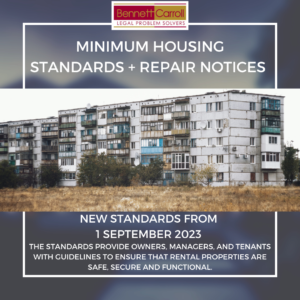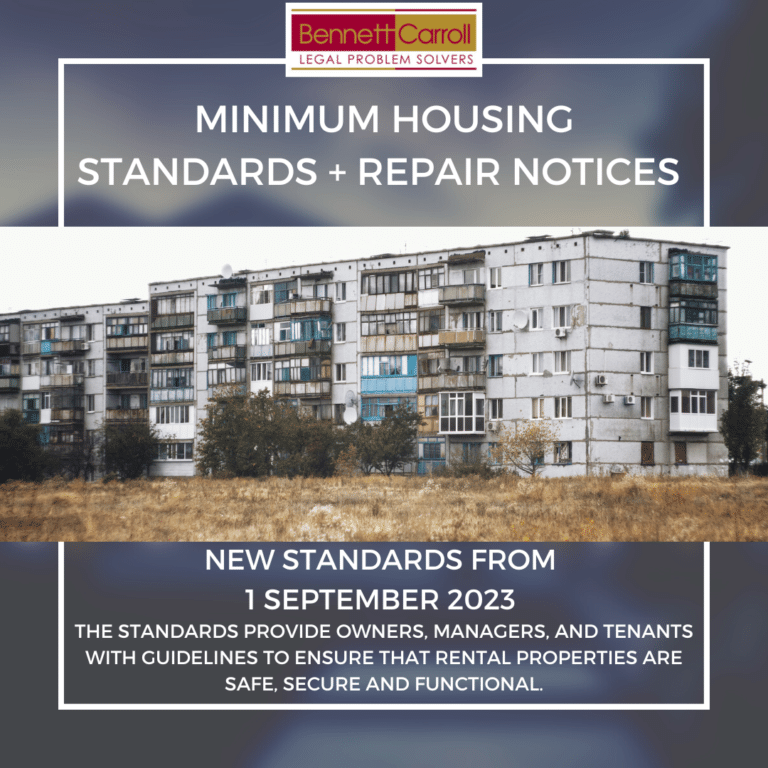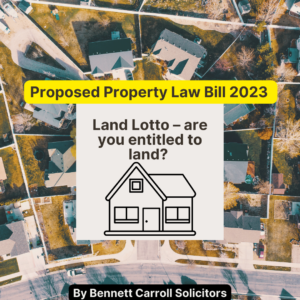Minimum housing standards will come into effect for new tenancies from 1 September 2023, and for all tenancies from 1 September 2024. The standards provide owners, managers, and tenants with guidelines to ensure that rental properties are safe, secure and functional. Below is an overview.
Overview
Under s 17A of the Residential Tenancies and Rooming Accommodation Act 2008, minimum housing standards include any of the following
(a) sanitation, drainage, cleanliness and repair of the premises, inclusions or facilities;
(b) ventilation and insulation;
(c) protection from damp and its effects;
(d) construction, condition, structures, safety and situation of the premises, inclusions or facilities;
(e) the dimensions of rooms in the premises;
(f) privacy and security;
(g) provision of water supply, storage and sanitary facilities;
(h) laundry and cooking facilities;
(i) lighting;
(j) freedom from vermin infestation;
(k) energy efficiency.
Examples
A rental property must:
- be weatherproof and structurally sound
- be in good repair
- fixtures and fittings (eg electrical appliances) should not be likely to cause injury through normal use
- have functioning locks or latches on all external doors and windows that can be reached without a ladder (ie ground floor)
- be free from vermin, damp and mould (unless the vermin, damp or mould has been caused by the tenant)
- include curtains or other coverings that give privacy to areas such as bedrooms and bathroom (tinting or frosting windows is acceptable) – however if fences, trees or hedges block the windows, coverings are not necessary.
- if there is a laundry, it does not have to have a washing machine or other white goods.
A property should have ‘reasonable’ functionality such as
- have adequate plumbing and drainage
- be connected to hot and cold suitable drinking water
- have flushable toilets connected to a sewer, septic tank or other waste disposal system
- if a kitchen is provided the cooktops must be functioning
- if a laundry is provided, the plumbing should be adequate, taps and fixtures should be functional
Each property will be assessed on a case-by-case basis. The main focus is to ensure a rental property is secure and safe.
The standards apply to all new tenancy agreements and includes tenancy agreements that are being renewed, even if the existing tenants remain at the property.
Apartments
The same minimum standards apply to apartments. Issues might arise as to if it is a Body Corporate or an owner’s issue.
Failure to maintain the “outside” of the apartment and/or common areas is generally a Body Corporate’s issue: for example if mould results from a failure of the Body Corporate to clean the gutters or if a pipe in a wall between two properties bursts.
If the block is registered under a building format plan then it is a Body Corporate issue, if it is a standard format plan then most likely it is an owner issue.
Rooming Accommodation
The same minimum standards apply to rooming accommodation. For further information see the Residential Tenancies Authorities website.
Repair Orders
Since October 2022, if repairs to properties are not done in a timely manner, then tenants can apply to QCAT for a Repair Order.
In granting a Repair Order, QCAT considers the procedures followed, the effect of the breakdown/fault/damage on the tenant, the potential for injury, and the owner’s/manager’s conduct.
QCAT may make an order about what is, or is not, to be repaired; by what date; who is to arrange and pay for the repair; and compensation to the tenant. It may make recommendations if the repairs are not completed by the stated due date ie if the tenancy can be terminated. Extensions can be granted for reasons such as hardship, location, shortage of materials or suitable repairer. QCAT sends a copy of the order to the RTA. It is an offence under the Act to contravene a repair order.
The order remains in place if the tenants leave or the property is sold. An unresolved order must be disclosed in new tenancy agreements. A tenant can leave because of failure to comply with a repair order.
The relevant legislation for a Repair Order is
- s 221 apply for a repair order;
- s 221A granting a repair order;
- s 221B extension time to comply with a repair order;
- s 221C offence to contravene repair order;
- s 307D tenant’s intention to leave due to failure to comply with repair order
To ensure that you are up to date with legal requirements contact Bennett Carroll.
Call us on or email and safeguard your interests every step of the way- We are your legal problem solvers.








